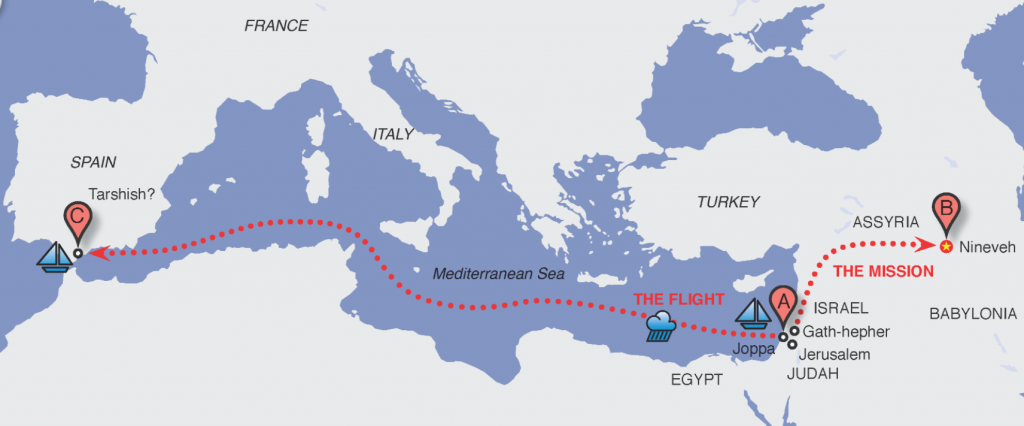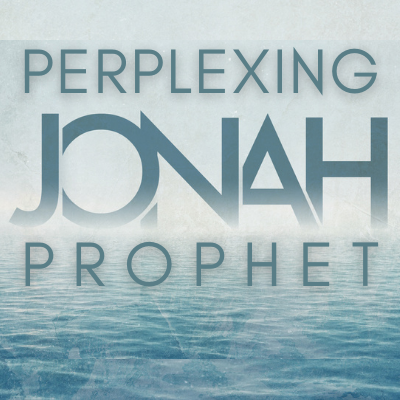TALKING POINTS / WALKING POINTS
Dig deeper into the message during the sermon, in your personal Bible study, or with your family or Community Group in application-driven discussion.
COMMUNITY GROUP LEADER’S GUIDE
SERMON SUMMARY
Key Text: Jonah 1
Today we find Jonah, the prodigal prophet, in a three-fold relationship:
[1] Jonah’s relationship to God (v. 1-3). Three commands summarize God’s will to Jonah: (1) arise, (2) go, and (3) cry. God called Jonah to go to Nineveh, one of the great cities of the ancient world. Jonah was not left to wonder, “What does God want me to do?” Nineveh, the capital of Assyria, was a problem for Jonah. Nineveh was morally corrupt, wicked, and violent. Their worship of their idol, Molech, involved child sacrifice. Mothers threw their infants into an oven in the belly of the idol. Pagan priests chanted and beat drums in order to drown out the screaming of the dying babies. And God said, “That disturbs me!“ (Today we sacrifice our babies in a more sterile, clinical environment, but God is still greatly displeased. God has not changed, and apparently, neither have we.) Ninevite armies were known for their cruelty; at times they skinned their captives alive, then impaled them upon poles and left them to die. So the Assyrians were a wicked, inhumane, corrupt, depraved, cruel, decadent, degenerate, immoral society, and God purposed to do something about it! In the face of evil, have you ever asked: “Why doesn’t God do something?” He is and he will, but think about it: if God put an end to all evil today, who of us would be left? God told Jonah to go to Nineveh—500 miles to the east—and instead he set out for Tarshish, 2,000 miles to the west! Jonah is the only prophet in the Old Testament who received his call from God and said, “No! I’m not doing it.” Jonah resigned his calling as a prophet. We do that too—how often we refuse God’s will and yet convince ourselves that we are obeying! When we do, we are stepping into a trap of our own making.

[2] Jonah’s relationship with the pagan sailors (v. 4-14). Jonah fled, but God chased after him! God hurled a great wind at Jonah’s boat. All the pagan sailors cried out to their gods in terror— while Jonah slept. Jonah had desensitized his conscience to God and to others’ suffering. We do it too. Ask yourself: “How sensitive am I to sin? Does it shake me up—or am I cavalier about it?” One of the characteristics of holiness is a growing revulsion to sin. In the middle of this chaotic storm, with the boat falling apart, the sailors wake Jonah and hurl a bunch of questions at him (v. 8). Jonah answered honestly: “My God made the sea and the dry land”—and the men were terrified (v. 9-10). When they asked him what they could do, Jonah said, “Just hurl me into the sea” (v. 11-12)—something they were unwilling (at first) to do (v. 13). These pagan sailors were more concerned for Jonah than he was for them and for Nineveh! In the end, these sailors stopped praying to their idols and started praying to Jonah’s God—Yahweh—who heard them, and calmed the sea.
[3] Jonah’s relationship with the fish (v. 15-17). Yahweh not only saved Jonah (more about the fish next week), he saved these pagan sailors. Think about it: Jonah, despite himself, was used by God to point these pagan sailors to salvation. We see that God’s message is more important than the messenger. God honors his Word, even when it comes from a sinful servant. Back to Jonah, in the belly of the fish. What did God purpose through this bizarre miracle? First, God was disciplining his prophet (see Hebrews 12:3-11). We discipline our kids; and God disciplines his. Make sure you respond at God’s first “swat”, so that he doesn’t have to increase your discipline (1 Corinthians 11:30-32). Second, God was preserving His prophet. Do you thank God that he redeems our lives from destruction (Psalm 103:4)? Jonah was discarded by the sailors, but not by God. God wasn’t through with him yet! Third, God was preparing His prophet. One of Nineveh’s idols was the fish god Dagon—and next week I’ll explain how that may have helped produce their miraculous response to Jonah’s preaching!
APPLICATION / CHALLENGE
- When the Lord calls you to do something, don’t fear the consequences.
- When you disobey and try to run away, expect God to come after you.
TAKE ONE STEP
Each week, write down one doable concrete step of obedience, small or large, that you will put into practice this week. (James 1:22: “But prove yourselves doers of the word, and not merely hearers who delude themselves.”)


